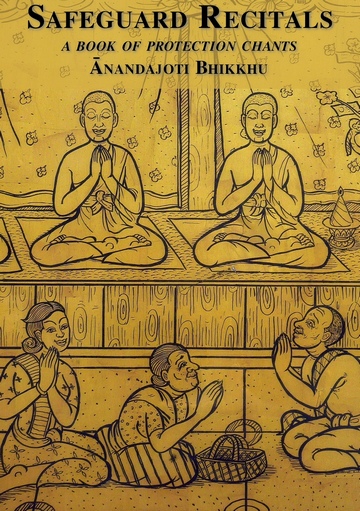A few weeks ago I announced the publication of a new version of my popular chanting book Safeguard Recitals.
At that time I had started recording the Pali text to accompany the book. I have just now finished that work and have embedded the recording in the website.
The recordings in total last for around 6 1/2 hours, and were done while I have been having a lot of trouble with coughing and chest problems, so the voice is a little gritty at times.
I have made the recording in what I term a Plain Chanting style, that is: it is unembellished, is pronounced according to written form, and does not conform to a tradition.
In other words it is a tradition-free rendering of the texts in (what I hope is) a more or less accurate and plain format.
As I announced last Sunday it is now possible to download individual files from the page they are embedded in, starting here; or all the files can be downloaded in a zip from here.

…thank you!
Dear Bhante Anandajoti,
Thank you so much for your Safeguard Recitals translation, I find it very useful as you have translated every sentence and place it right under the Pali language. I am using it every night since the beginning of Vassa (12th July 2014) at the Sri Lankan Temple in Penang, Malaysia (nightly Vassa chanting session).
As I am a young Buddhist, could you please advise on how to shorten the ‘Atanatiyasuttam’ for the purpose of memorizing it. In your earlier publication, I found your numbering starts from ‘The Seven Buddhas’ and there seem to be two sets of chanting instructions given by ‘Maharaja Vessavano’ in Part One or Part Two. The first set ends with ‘‘vijjacaranasampanam, Buddham vandama Gotaman! ti’’. The second set starts with ‘‘Yassa kassaci marisa – bikkhussa va,… – ayam ‘Atanatiya’ rakkha suggahita, bhavissati samatta pariyaputa, tan-ce amanusso -…’’ and ends with ‘’Ayam kho sa marisa, ‘Atanatiya’ rakkha,… guttiya, rakkhaya, avihimsaya, phasuviharaya ti’’.
Please advise as soon as possible, as I have a natural inclination towards the forest since at a young age.
With Metta,
Chew.
Hi Eric, I’m not sure I know what you want. The parittaṁ in short is this:
“Vipassissa namatthu, Cakkhumantassa sirīmato,
“May you revere Vipassī, the glorious Visionary,
Sikhissa pi namatthu, sabbabhūtānukampino, [1]
may you revere Sikhī, who has pity on all beings,
Vessabhussa namatthu, nahātakassa tapassino,
may you revere Vessabhū, the austere one, cleansed (of corruptions),
namatthu Kakusandhassa, Mārasenāpamaddino, [2]
may you revere Kakusandha, who has crushed Māra’s army,
Koṇāgamanassa namatthu, brāhmaṇassa vusīmato,
may you revere Koṇāgamana, the accomplished brahmin,
Kassapassa namatthu, vippamuttassa sabbadhi. [3]
may you revere Kassapa, who is free in every respect.
Aṅgīrasassa namatthu, Sakyaputtassa sirīmato,
May you revere Aṅgīrasa, the glorious son of the Sakyans,
yo imaṁ Dhammam-adesesi, sabbadukkhā panūdanaṁ. [4]
he who preached this Dhamma, which is the dispelling of all suffering.
Ye cāpi nibbutā loke, yathābhūtaṁ vipassisuṁ,
Those who are emancipated in the world, who have insight (into things) as they are,
te janā apisuṇā, mahantā vītasāradā, [5]
those people free from malicious speech, who are great and fully mature,
hitaṁ devamanussānaṁ, yaṁ namassanti Gotamaṁ,
they will revere that Gotama, who is of benefit to gods and men,
vijjācaraṇasampannaṁ, mahantaṁ vītasāradaṁ. [6]
who has understanding and good conduct, who is great and fully mature.
The other parts starting from Yassa kassaci mārisa… are rather an encouragement than a parittaṁ in themselves.
Are you using the new edition? See: http://records.photodharma.net/texts/two-chanting-books-now-in-hard-copy-for-free-distribution
also see: http://records.photodharma.net/?s=safeguard+recitals
If not, when I return to Malaysia after the Rains I can send copies for Mahindarama.
Metta, Anandajoti
Hi Bhante Joti,
Thank you for your attention and effort, but it looks very short without ‘The East’, ‘The South’, ‘The West’ and ‘The North’. We at Mahindarama are still using your old edition, as a few hardcopies of it are still available for free distribution from the library.
Sorry for being repetitious, what I am looking for is to be able to chant the ‘Atanatiyasuttam’ as closely and as completely as possible to the original ancient texts, as it is mention ‘’Yassa kassaci marisa – bhikkhussa va… – ayam ‘Atanatiya’ rakkha suggahita, bhavissati samatta pariyaputa, tan-ce amanusso -…’’, without knowing how it was chanted from ancient time until now.
Since I found many of the modified & shorten versions from various different practicing countries on the web and the nightly chanting session of the ‘Atanatiyasuttam’ was too complete & too long (part one & two) to memorize, it leaves me no choice but to look for a middle path, that is to turn to the expert for advise (which is you, Bhante).
My intension is to ‘’vanapatthani pantani senasanani patisevanti, appasaddani, appanigghosani, vijanavatani, manussarahaseyyakani, patisallanasaruppani.
With Metta
Eric.